Proof of Collusion, Chapter 2: Trump and the Agalarovs
Proof is publishing the entirety of 2018 New York Times bestseller Proof of Collusion for free. Sign up for Proof as a free subscriber to get each chapter in your inbox. The comment fields are public.
If you would like to become a full subscriber to Proof for just $5/month, click below:
{Note: The thousands of endnotes—each pointing to major-media citations—that appear in the print edition of this book are exclusively in that volume. Click here to purchase Proof of Collusion (by Seth Abramson, first published by Simon & Schuster in 2018) in print. If you would like to comment in the comment fields below, feel free to do so whether you are a paid Proof subscriber or not. Comments may be lightly moderated as/if it becomes necessary. Note that Proof of Collusion is only 300 pages of a four-book, 2,500-page series, so this volume is just one piece of a massive trove of evidence relating to the political career of Donald Trump.
This text has been carefully reviewed by a team of lawyers and professional fact-checkers at a cost in the tens of thousands of dollars. See the print edition of this book for all citations and endnotes, which are implicitly incorporated into this republication. This republication also incorporates all five volumes of the 2019 Senate Intelligence Committee Report on Russian Interference in the 2016 United States Presidential Election and the two-volume Mueller Report, which can be found here and here, respectively. Any disparity between this book and those reports—though this author isn’t aware of any—should be resolved in favor of the latter.
Any typographical errors in the text below have been accidentally introduced as a result of the transition of the text from a print to a digital format, and do not appear in the print edition. The text here is otherwise identical to the text of the print edition, excepting a small number of minor edits made to maximize clarity. The substance of the volume remains untouched.}
Table of Contents
The chapter you are now reading is in bold. Any chapters already published are active links to those chapters as published here at Proof.
Introduction: A Theory of the Case
Date: October 2018
Chapter 1: Russia and the Trumps
Dates: 1987 to 2012
Chapter 2: Trump and the Agalarovs
Date: 2013
Chapter 3: Kompromat
Date: November 2013
Chapter 4: The Campaign Begins
Dates: 2013 to 2015
Chapter 5: The National Security Advisory Committee
Dates: January to March 2016
Chapter 6: The Mayflower Hotel
Date: April 2016
Chapter 7: The Back Channels
Dates: May to June 2016
Chapter 8: The Republican National Convention
Date: July 2016
Chapter 9: The Hunt for Her Emails
Dates: July to September 2016
Chapter 10: The October Surprise
Date: October 2016
Chapter 11: The Transition
Dates: November 2016 to January 2017
Chapter 12: The Firings of Flynn and Comey
Dates: February to May 2017
Chapter 13: Testimony and Plea
Dates: June to December 2017
Chapter 14: A Nation in Suspense
Date: 2018
Afterword: The Death and Rebirth of America
Date: 2019
Chapter 2: Trump and the Agalarvos
2013
Summary
Donald Trump invites a powerful, Kremlin-linked developer to go into business with him while he is dramatically increasing his political profile—and after he’s conducted exploratory polling to test a 2016 White House bid.
During a November 2013 trip to Moscow to put on the Miss Universe pageant with his new business partner, Trump signs a letter of intent to build a “Trump Tower Moscow.” After Trump leaves Moscow, he maintains a strong relationship with his new Russian business associates—having left a clear impression on his Moscow hosts that he will not only run for the American presidency but on a platform opposing all sanctions on Russia.
Given the opportunity to be forthcoming as to his financial and personal dealings in Moscow in late 2013, Trump dissembles, telling voters false stories about his actions that suggest he has something significant to hide.
The Facts
In June 2013, Donald Trump invites Aras and Emin Agalarov to join him at the Miss USA pageant in Las Vegas. Aras is a billionaire developer who does building projects for the Kremlin; Emin is an aspiring pop star. Aras’s favor with the Kremlin is demonstrated in part by the Kremlin sending a senior official, Vladimir Kozhin, to a party at Agalarov’s Crocus City complex. Kozhin is the Kremlin’s “chief manager” and called “a top government official and member of Putin’s inner circle” by Mother Jones.
Aras and Emin have gotten onto Trump’s radar screen by selecting the 2012 Miss Universe, Olivia Culpo, to star in one of Emin’s music videos. A trip by Miss Universe pageant officials to Moscow ensues, and discussions begin about the possibility of Miss Universe going to Moscow in 2013. The Miss USA pageant is an opportunity for Trump to speak to the Agalarovs in person about the idea. The group that gathers in Las Vegas includes the Agalarovs, Trump, Trump’s attorney Michael Cohen, Emin’s publicist Rob Goldstone, Trump’s bodyguard Keith Schiller, and Ike Kaveladze, a vice president at the Agalarovs’ company, The Crocus Group—called by the Guardian “one of the biggest corporations in Russia, carrying out government building contracts worth hundreds of millions of dollars from Putin’s administration.”
The Guardian will later write that Kaveladze “has in fact been an associate of some of Russia’s richest and most powerful people for the past three decades. . . . [He] was involved in the $341 m[illion] takeover of a US company by a Russian mining firm belonging to an associate of Putin, and was a business partner to two former senior officials at Russia’s central bank.” The transaction, overseen by Kaveladze, was “the first time a Russian company had ever taken a majority stake in a publicly traded US company. . . . Putin was reported at the time to have personally advocated for the deal’s approval by U.S. regulators.” In 2000, the New York Times reported that Kaveladze helped “an unknown number of Russians . . . [move] more than $1.4 billion through accounts at Citibank of New York and the Commercial Bank of San Francisco. . . . Kaveladze, who immigrated to the United States from Russia in 1991. . . . set up more than 2,000 corporations in Delaware for Russian brokers and then opened the bank accounts for them, without knowing who owned the corporations.”
According to the Guardian, “U.S. authorities said [the $1.4 billion Ike Kaveladze transferred] may have been used for money laundering.”
On the day of the Miss USA pageant, Yulya Alferova—a popular Russian blogger, the wife of Russian billionaire Artem Klyushin, and later the organizer of the 2013 Miss Universe pageant for the Agalarovs—posts nine candid pictures of Trump, the Agalarovs, Kaveladze, and the other members of Trump’s entourage dining in Las Vegas the night before; it is unclear whether Alferova or Klyushin was in Las Vegas also.
Trump and the Agalarovs bond immediately. “Look who’s come to see me! It’s the richest man in Russia!” Trump bellows just minutes after meeting Aras Agalarov for the first time. The Guardian reports that Trump “quickly” agreed to Agalarov’s offer of $20 million to bring the Miss Universe pageant to Moscow; Emin will later say that Paula Shugart, “Trump’s top Miss Universe executive”, confessed to him of the pageant, “We have a lot of debts.” Later on the night before the pageant, Trump tells Emin that he trusts him and that the Trump Organization and the Crocus Group will have an excellent business relationship going forward.
On the day of the pageant, Trump brings Aras Agalarov onstage to announce the 2013 Miss Universe pageant will be in Moscow. Trump thus chooses Russia as the next pageant site approximately twenty-four hours after meeting the Agalarovs for the first time and over the bids of seventeen other nations. The Daily Mail will note in February 2018 that not only does Trump pick pageant sites based on business considerations, but he also uses the same measure to select the competition’s finalists, titling its report on the subject “Donald Trump hand-picked finalists for Miss Universe from countries he targeted to swing deals and hosted the contest in cities where he already had a financial stake, former contestants claim.” According to the Mail, it isn’t just contestants who have accused Trump of using his pageants as a front for his business interests: “preliminary judges tasked with selecting the finalists said they were shocked when their votes were tallied and some women who advanced to the final stage weren’t selected by any of the judges” (emphasis added). Kerrie Baylis, a former Miss Jamaica, tells the New Yorker, of the list of finalists in the year she participated in the Miss Universe pageant, “[T]he list looked like the countries Donald Trump did business with, or wanted to do business with.”
In Las Vegas in 2013, the Agalarovs promise Trump not only $20 million but also, more importantly, an opportunity to meet with Vladimir Putin and the prospect of building a Trump Tower Moscow on the site where the 2013 Miss Universe pageant will be held.
The day after the pageant is announced, Trump tweets, “Do you think Putin will be going to The Miss Universe Pageant in November in Moscow—if so, will he become my new best friend?” He also, per the Washington Post, writes a personal letter to Putin—now in the hands of the special counsel—saying, among what else is as yet unknown, that he looks forward to seeing Russia’s “beautiful women” once he gets to Moscow. Asked by Washington Post reporters in March 2018 to give more information about Trump’s private letter to Putin in 2013, Trump’s then attorney John Dowd will respond simply, “It’s all nonsense”, and say no more on the subject.
In Moscow in the summer of 2013, “a meeting with Trump [is] indeed penciled into Putin’s diary by aides, but [falls] off his schedule a few days beforehand.”
Trump arrives in Moscow in early November 2013 with two U.S. business partners in tow, Alex Sapir and Rotem Rosen, whose ties to powerful Russians are substantial. He immediately begins conducting business meetings with bankers and other influential Russians who can help him and Aras Agalarov move forward with their Trump Tower Moscow project.
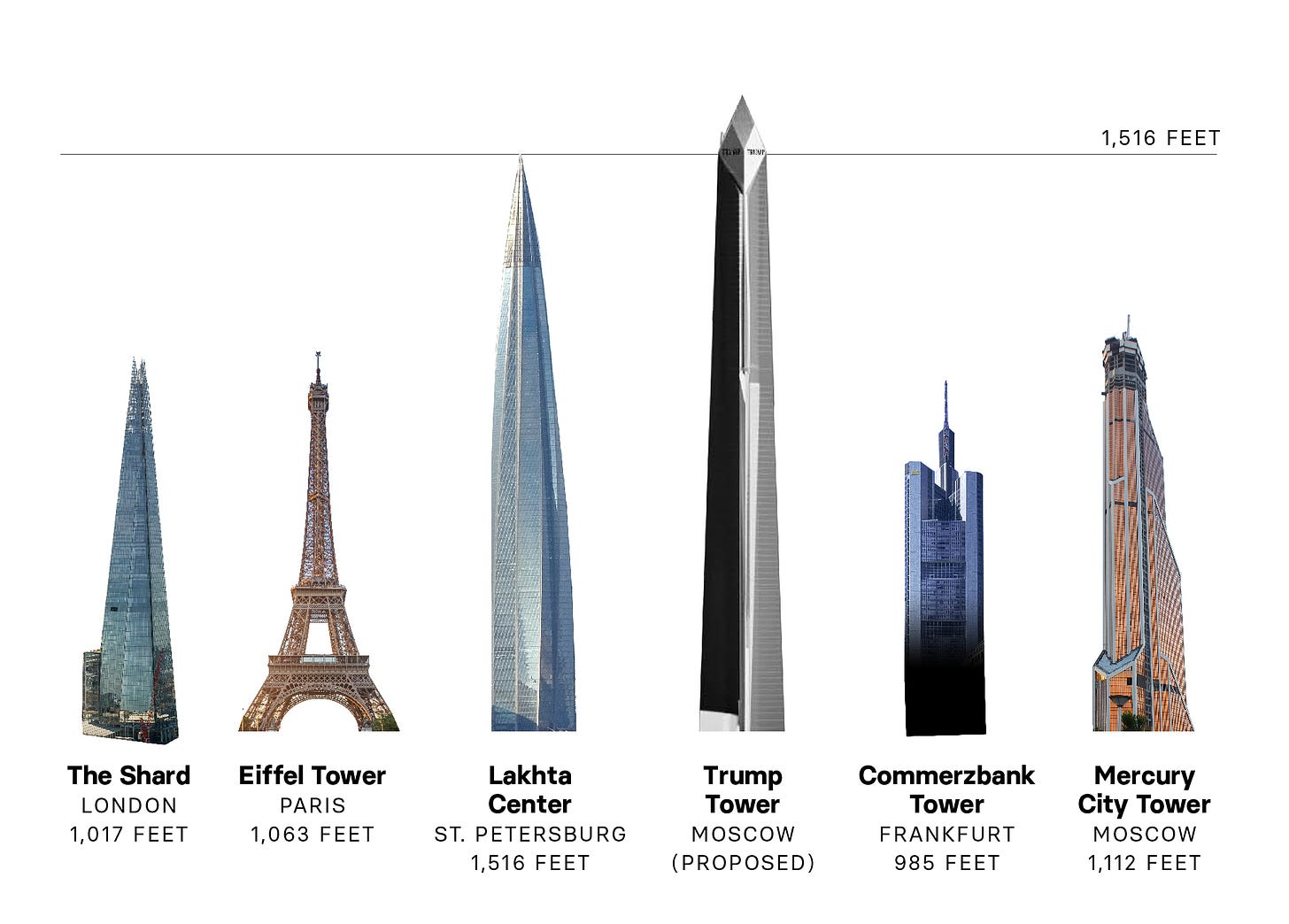
After promising that he will attend the pageant, Putin suddenly chooses not to do so.
He does, however, send Trump, according to Aras Agalarov, a handwritten note—the contents are unknown—and “a traditional decorative lacquered box.” In March 2014, at the annual Conservative Political Action Conference, Trump will tell the assembled GOP activists that “Putin even sent me a present, beautiful present, with a beautiful note. I spoke to all of his [Putin’s] people [in Moscow].” After Trump returns from Moscow, Agalarov’s daughter will deliver a “polished black box” and a “sealed letter from the Russian president himself.” It is unclear if this is the same box and letter as Agalarov says Trump received at the pageant, but Agalarov implies it is not: in March 2018 he tells the Washington Post that Trump “was leaving [the 2013 pageant in Moscow] with very warm feelings . . . very happy”, because, Agalarov says, he had already received, at the pageant, a letter from Putin (in a “Russian lacquered box”, says Agalarov) whose contents Agalarov could confirm were “friendly.”
Prior to the 2013 pageant, Trump speaks by phone with “an oligarch close to Putin”, Dmitry Peskov, during which Peskov says Putin wants to invite Trump to attend the 2014 Winter Olympics in Sochi scheduled for February 7–23, 2014.
According to some accounts—including Trump’s own—Trump does speak to Putin on the day of the pageant: “I spoke indirectly and directly with President Putin, who could not have been nicer”, Trump will say in a May 27, 2014, appearance at the National Press Club. A longtime friend of Trump’s, actor Tom Arnold, bolsters Trump’s claims of having spoken to Putin “indirectly and directly,” saying he has knowledge of a speakerphone call between Trump and Putin on November 9 at the Ritz-Carlton Moscow because it was witnessed, he will say repeatedly on social media, by NBC executive Chuck LaBella and others. Per Arnold, “Putin called Trump at [the] Moscow Ritz [in] Nov[ember] 2013. Trump put [it] on speakerphone for everyone to hear. Putin congratulated Trump on Trump Tower Moscow & encouraged Trump to run for President & offered Russia’s support. It’s all on tape.”
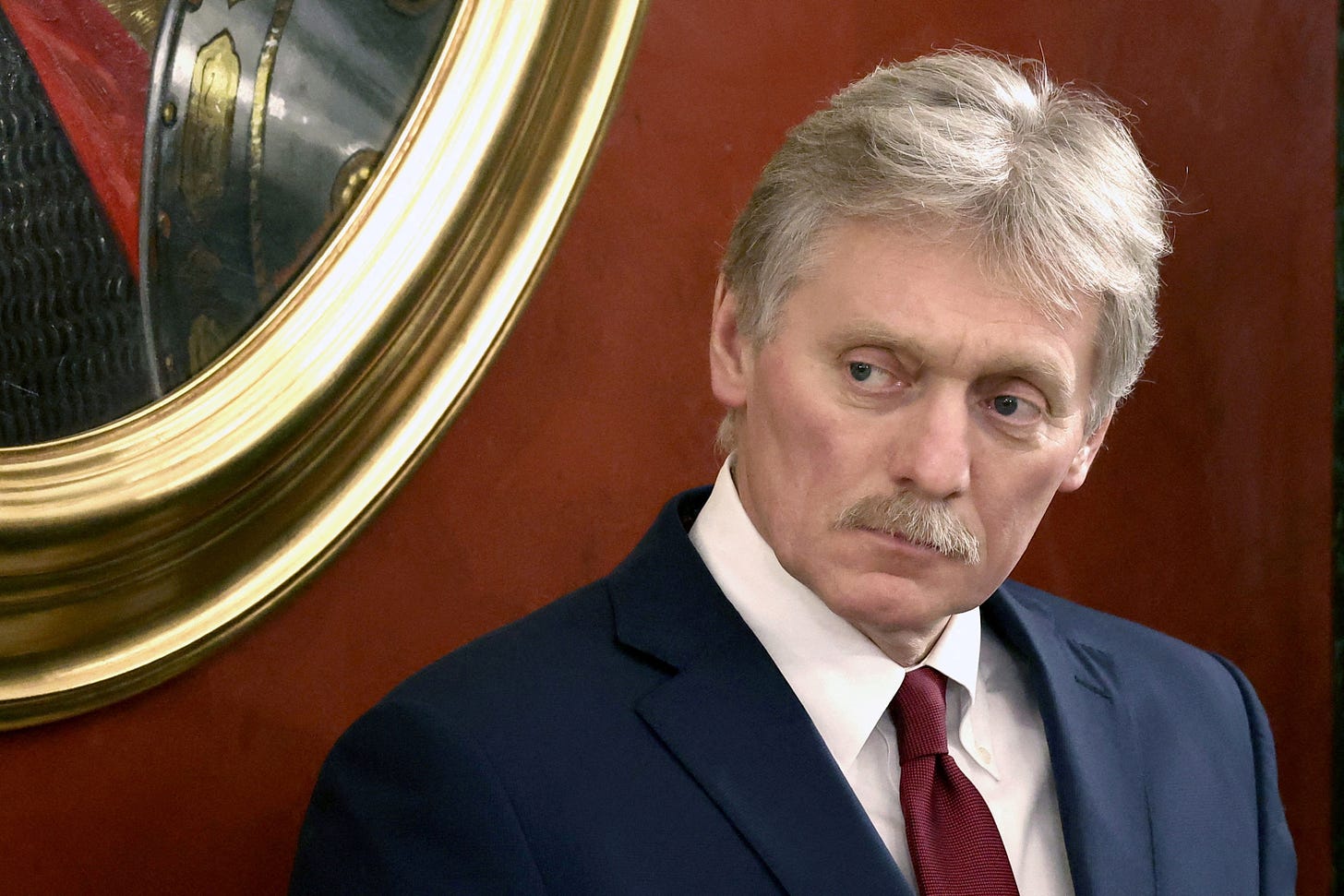
According to a retrospective in the Guardian, Trump “certainly claimed” to have met “associates of Putin [in Moscow in November 2013] in lieu of the president himself”, saying, “I was with the top-level people, both oligarchs and generals, and top-of-the-government people. I can’t go further than that, but I will tell you that I met the top people, and the relationship was extraordinary.” One of those who attends the Trump pageant and after-party in President Putin’s stead is Vladimir Kozhin, who had previously attended a Crocus Group event and “from 2000 until 2014 was head of the Kremlin property department”, according to Reuters—meaning he was one of the officials in the Kremlin with the authority to pave the way for new building projects in the city like Trump Tower Moscow.
In their book Russian Roulette, David Corn and Michael Isikoff note that Kozhin, a “senior Putin aide”, was “a high-level emissary” sent to Trump by Putin himself. The message of welcome to Trump—and, more particularly, to Trump Tower Moscow—would have been, based on Trump’s experience in the Moscow real estate market, unmistakable. In a 2017 interview, then Trump attorney Michael Cohen, who was for years an executive vice president at the Trump Organization, will say of Trump Organization forays into the Russia real estate market: “Their system is different from ours. The Kremlin has to approve buildings in Moscow. That’s not undue influence. That’s just the way it is.” According to a 2013 Miss Universe pageant official, even beauty pageants were approved by Putin: “We all knew that the event [the 2013 Trump pageant in Moscow] was approved by Putin”, said the official, “[as] you can’t pull off something like this in Russia unless Putin says it’s okay.”

Another VIP guest at the pageant is a Russian who lives in Trump Tower in New York City named Alimzhan Tokhtakhounov. According to a Mother Jones report, Tokhtakhounov is a “vor—a Russian term for a select group of the highest-level Russian crime bosses. . . . [A boss who] receives tributes from other criminals, offers protection, and adjudicates conflicts among other crooks.” The U.S. attorney for the Southern District of New York, Preet Bharara, had previously indicted Tokhtakhounov for, according to the 2013 indictment, operating an international sportsbook that laundered more than $100 million—alleging that, as the indictment was described by Mother Jones, the Russian was using “his ‘substantial influence in the criminal underworld’ to protect a high-stakes illegal gambling ring operating out of Trump Tower” in New York City. More significant to Trump’s desire to meet Russian oligarchs while in Moscow is that, per Bharara’s indictment, Tokhtakhounov and others ran “an international gambling business that catered to oligarchs residing in the former Soviet Union and throughout the world.” As of late 2016, Tokhtakhounov was wanted by Interpol on charges including conspiracy to commit wire fraud and bribery.
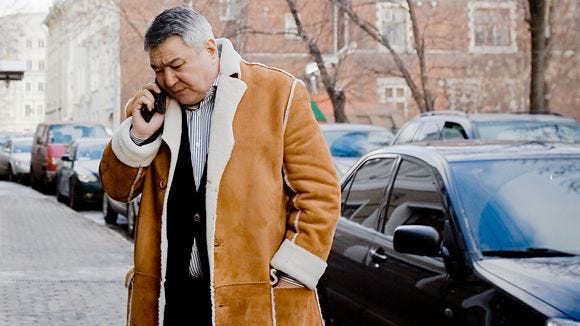
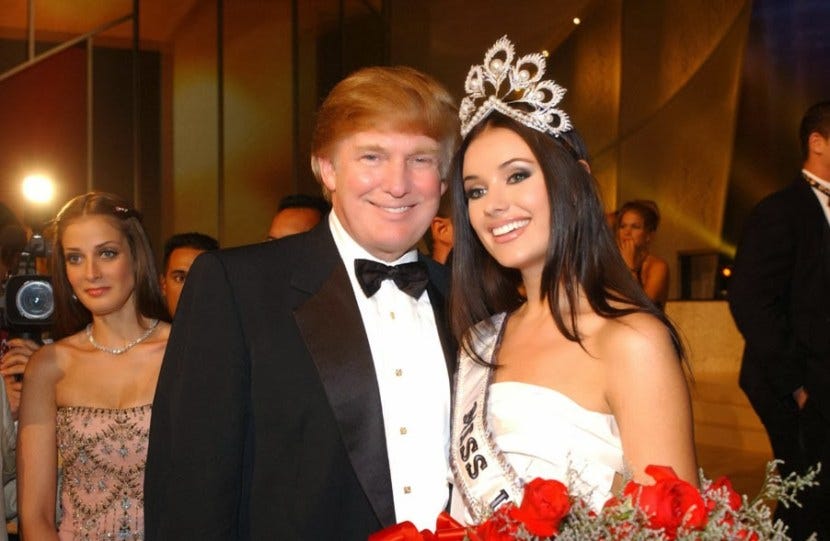
During the pageant, Trump and Agalarov announce their plans to build Trump Tower Moscow, and ten days later more than $2 billion in funding is announced by a state-owned Russian bank, Sberbank, whose CEO, Herman Gref, is both a close associate of Putin’s and has met directly with Trump during his trip to Moscow. Gref will later tell Bloomberg he was impressed by Trump’s “attitude toward Russia”; both Gref and Agalarov will subsequently refuse to reveal who attended any of Trump’s meetings while he was in Moscow.
During one of his meetings on his first day in Moscow, either Emin Agalarov or a Russian associate of Agalarov tells Trump’s bodyguard, Keith Schiller, that five prostitutes can be sent to Trump’s hotel suite at the Moscow Ritz-Carlton that night if he so desires.
On the day he returns from Moscow—November 10, 2017—Trump tweets, “I just got back from Russia—learned lots and lots. Moscow is a very interesting and amazing place! U.S. MUST BE VERY SMART AND VERY STRATEGIC.” The next day he adds to his prior tweet about American foreign policy by tweeting about the deal he announced in Moscow: “Aras Agalarov, I had a great weekend with you and your family. . . . TRUMP TOWER MOSCOW is next.”
In December 2013, just over a month after his return from Moscow, Trump begins formally reaching out to influential Republicans on the subject of a presidential run, which he predicts in conversations with politicians in New York will begin in 2015.
In August 2018, a top Trump adviser back in 2012 and 2013, Sam Nunberg, will tell Michael Isikoff of Yahoo News, “In 2013 I knew he was running for president. I knew he was running for president the minute Obama won Virginia [in 2012].” On January 22, 2014, Yulya Alferova, an agent of the Agalarovs, tweets, atop a picture of her and Trump in Moscow, “I’m sure Donald Trump will be [a] great president! We’ll support you from Russia! America needs [an] ambitious leader!” On March 22, 2014, Alferova retweets Trump four times in succession, including this tweet from the then businessman: “The situation in Russia is much more dangerous than most people may think—and could lead to World War III. WE NEED GREAT LEADERSHIP FAST.” On March 29, 2014, the Agalarov employee retweets Trump three times in succession, with all three tweets on the subject of the Agalarovs’ new business partner running for president. According to both Emin Agalarov and Donald Trump Jr., the Agalarovs and Trumps are still planning a Trump Tower Moscow at this point.
In early February 2014, less than two weeks after the first of Alferova’s flurry of tweets about a Trump presidential run in 2016, Ivanka Trump arrives in Moscow to scout possible locations for an Agalarov-built Trump Tower Moscow. Meanwhile, Trump is telling the media that he had contact with Putin as he was negotiating and finalizing the Trump Tower Moscow deal in Moscow. He tells Fox News on February 10, 2014, that Putin “contacted him” when “he went to Russia with the Miss Universe pageant” and that during that “contact” Putin was “so nice.” Soon afterward, Russia’s effort to annex Crimea leads to sanctions from the United States, which forces Trump to put plans for Trump Tower Moscow on hold because the Moscow project’s funder, Sberbank, is one of the sanctioned entities.
Three months later, in May 2014, Trump speaks at the National Press Club and tells the assembled reporters that when he was in Moscow for the Miss Universe pageant he spoke, both “indirectly and directly, with President Putin, who could not have been nicer, and we had a tremendous success.” Trump adds some detail on the content of the conversation, saying, “[T]o do well, you have to get the other side to respect you, and he [Putin] does not respect our president, which is very sad.”
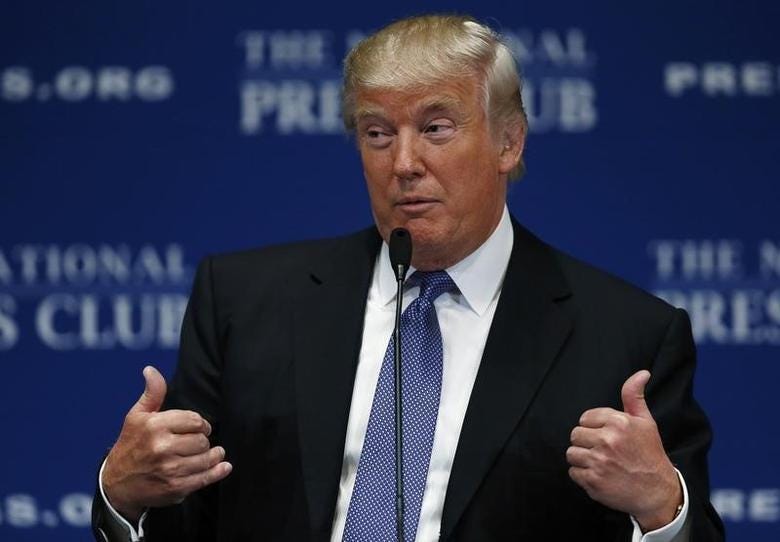
In the fall of 2015, a Politico reporter contacts an unnamed Trump adviser to ask him “about memos saying the New York businessman was involved in an orgy in Russia”; the reporter explains that “the information [is] from a document made by Fusion GPS that [is] floating around.”
The Fusion GPS document is being financed, per the New York Times, by “a wealthy Republican donor who strongly oppose[s] Mr. Trump.” The Republican donor hires a journalist-owned and -operated D.C. research firm to “compile a dossier about the real estate magnate’s past scandals and weaknesses.” The Republican-funded allegation of Russian kompromat against Trump (see Chapter 3) will be republished in mid-2016 by Christopher Steele, a former MI6 agent who had been the head of the agency’s Russia desk. When Fusion GPS’s new client is later discovered to be a law firm under contract with the DNC, Trump will tweet on October 19, 2017, about the “discredited and Fake” dossier and ask whether it was “paid for” by “Russia, the FBI or the Dems (or all)?”
When the dossier is released in January 2017, Americans read for the first time the allegations from 2015—based on research funded by a Republican Trump opponent—that someone sent prostitutes up to Trump’s room in Moscow on November 8, 2013.
The dossier alleges, based on multiple sources, that what happened in Trump’s room at the Ritz-Carlton was recorded for the purposes of maintaining, in secret, substantial leverage over Trump for the foreseeable future—including for the entirety of his political career (see Chapter 3). The dossier also includes raw intelligence—meaning intelligence that hasn’t been confirmed—on Putin using proposed real estate deals in Russia to seal Trump’s loyalty.
The Trump-Agalarov letter of intent will remain active, according to Aras Agalarov, for three and a half years—a period covering the entirety of the 2016 presidential campaign. It expires only on Trump’s inauguration, according to a February 2017 statement to a Russian construction website by the elder Agalarov. However, in a mid-2017 Forbes interview, Agalarov’s son throws even this expiration date into doubt, revealing that the Agalarovs are still, as of mid-2017, in negotiations with Trump’s sons to do additional business—possibly including the building of a tower in Moscow.
Because Trump has not fully divested himself from the Trump Organization, he will benefit directly should the Agalarovs and his sons perform on the letter of intent he signed in 2013.
Annotated History
(with excerpts from the above chapter in italicized bold, followed by regular-font annotations; this section is key to understanding certain of the facts delineated in the Facts section, above)
1
Trump invites a powerful, Kremlin-linked developer to go into business with him while he is dramatically increasing his political profile—and after he’s conducted exploratory polling to test a 2016 White House bid.
On May 27, 2013, just days before Trump invited Aras Agalarov and his son to Las Vegas for the Miss USA pageant, the New York Post announced, in an article entitled “Trump Researches 2016 Run”, that the notoriously frugal Trump had just spent $1 million on pre-election research. The same day, Politico reported that “Trump is musing about running for president”, noting that Trump had just told a GOP county dinner in Michigan that “everybody” was telling him to “run for president.” Trump’s May 2013 polling expenditures studied all fifty states to determine his popularity in each. When asked about this substantial financial outlay, Trump lawyer Cohen underscored that Trump was serious about a potential run. “We didn’t spend $1 million on this research for it to sit on my bookshelf”, said Cohen. “Trump is exactly what this country needs [as president].”
Trump’s preoccupation with politics before and during his Moscow trip has been confirmed by one of the members of his entourage, Agalarov employee and 2013 Miss Universe pageant organizer Yulya Alferova. A November 9, 2013, tweet from Alferova reads, “I’m tweeting, Donald Trump is talking . . . again and again about Obama.”
The picture below the tweet shows Alferova, Trump pal Phil Ruffin, and Trump himself lounging in chairs as Trump talks on a cell phone. That Trump would be discussing politics on the phone while in Moscow—despite being in the city for only forty-eight hours and responsible for overseeing an international beauty pageant during that time—is noteworthy. In a January 2017 interview with the Daily Beast, Alferova added a new gloss to Americans’ understanding of what was on Trump’s mind while he was in Moscow for a couple of days working on a beauty pageant and a real estate deal: “[Trump] calculated every little detail coming to Moscow, knowing that our countries had serious tensions.” Alferova’s comment and earlier tweet seem to confirm that Donald Trump’s preoccupations during his Moscow trip were as much political as financial.
Trump knew who and what Aras Agalarov was when he entered into a letter of intent with him in November 2013. The Daily Mail has referred to Agalarov as an “oligarch who brings Putin ‘solutions not problems’” and as the “Russian leader’s go-to for tough projects (like wooing Trump).” The Mail called Agalarov a Kremlin “insider” who is “Putin’s main property developer” and the “liaison between Putin and Trump.” Agalarov is known as “Putin’s right-hand man when it comes to carrying out development projects”, wrote the Mail, and the Russian president is reportedly “fond” of him.
The Washington Post, on July 21, 2017, called Agalarov “a trusted executor for the Kremlin”, noting also that “[t]he Kremlin expects the country’s wealthiest business executives to take on, when asked, large-scale infrastructure projects, sometimes at a loss, to . . . promote Russia’s national interests. The fortunes of Russia’s rich can rise and fall precipitously based on the outcome of these prestige projects.”
These claims are substantiated by Putin twice using Agalarov or his family to send gifts to Trump and choosing Agalarov for the Kremlin’s grandest and most difficult land-development projects, including, as the New York Times has noted, Far Eastern Federal University, “a stretch of superhighway ringing Moscow”, and “two troubled stadiums for the 2018 World Cup, including one in a Baltic swamp.” After the last of these, reported the Times, “Mr. Putin pinned a blue-ribboned state medal, the Order of Honor, on Mr. Agalarov’s chest at a dazzling Kremlin ceremony.” In view of all this, the Times called Agalarov “a fixer for the Kremlin’s toughest jobs.”
Not only did Putin award Agalarov Russia’s Order of Honor—one of the highest honors any Russian civilian can receive—but the Kremlin builder received the medal, Putin’s clearest possible imprimatur, just ten days before Trump went into business with him.
2
In June 2013, Donald Trump invites Aras and Emin Agalarov to join him at the Miss USA pageant in Las Vegas. Aras is a billionaire developer who does building projects for the Kremlin; Emin is an aspiring pop star.
Emin was married, at the time, to the daughter of Azerbaijan’s president, which had already put him in Trump’s orbit, for Azerbaijani government officials are so notoriously corrupt that they habitually become deeply engaged in large domestic building projects. Trump had signed a big deal in Azerbaijan—for an edifice to be called “Trump International Hotel and Tower Baku”—in 2012. So when Trump met Aras and Emin in June 2013, the Agalarovs were implicitly able to help Trump bring not one but two dream deals to fruition: the completion of self-branded towers in both Moscow and Baku.
Trump knew, too, that if hosted by the Agalarovs in Moscow, the pageant would be held in the same development for which his new tower was slated. This juxtaposition of the pageant and Trump’s ambitions in real estate—and his ambitions in politics—was evident in Trump’s tweet announcing the Trump-Agalarov deal to bring the 2013 Miss Universe to Moscow. “A big deal that will bring our countries together!” Trump wrote on Twitter. In Trump’s press conference, he added that “Moscow right now in the world is a very, very important place. We wanted Moscow all the way. One of the great families in Russia is our partner.” Trump also quickly and quite publicly invited Putin to his pageant, seemingly confirming in his mind that this would be—in the flurry of activity surrounding his presidential exploratory phase—a Trump-Putin political event.
3
Trump and the Agalarovs bond immediately.
An unnamed veteran Western diplomat in Moscow told the Daily Mail, for an article dated July 13, 2017, that “[i]f there are skeletons in Trump’s dealings with Russia, Aras knows where they are. And if Aras Agalarov knows Donald Trump’s skeletons, you wouldn’t bet on Vladimir Putin not also knowing.”
In March 2018, Mother Jones painted a vivid picture of the Trump-Agalarov weekend in Las Vegas. At an intimate twenty-person VIP dinner the night before the Miss USA pageant, Trump talked business with Michael Cohen, Aras and Emin Agalarov, Emin’s British publicist Rob Goldstone—who would later set up and attend the now infamous June 9, 2016, meeting at Trump Tower—and Ike Kaveladze, an Agalarov employee who would join Goldstone at Trump Tower in June 2016. After dinner, the group headed to a nightclub to watch performances featuring seminude semi-nude women; while there is no public record of the specific acts performed that night, the club’s most popular acts include one in which “naked college girls simulate urinating on a professor” and another in which “one female stands over the other female and simulates urinating while the other female catches the urine in two wine glasses.”
{Addendum, 6/1/2023: In his book Disloyal, Michael Cohen would subsequently confirm that Trump viewed a “golden shower” performance at the club the Agalarovs had taken him to and was visibly enraptured by it, a reaction the Agalarovs couldn’t have missed—and one that may have informed the activities they wanted prostitutes to perform in front of Trump in his hotel suite in Moscow in November 2013, just 120 days after the risqué performance in Las Vegas.}
According to Goldstone, Trump said to Emin, as the two men watched provocatively attired women dance for them, “When it comes to doing business in Russia, it’s very hard to find people in there you can trust. We’re going to have a great relationship.”
On another night less than five months later, either Emin or an associate (depending on whether you believe a source who spoke to the Daily Caller or Trump bodyguard Keith Schiller’s testimony before Congress) would tell Schiller that prostitutes could be sent up to Trump’s room at the Ritz-Carlton Moscow if he wanted. And Christopher Steele’s dossier reports that that nocturnal visit did in fact come to pass—and that Trump requested the women sent to him perform acts of urination.
Pictures on social media confirm that Trump maintained his relationship with the Agalarovs throughout 2014, with Emin boasting to Forbes in July 2017 that after November 2013 “every time I was in America—in New York, in Miami—I performed at one of [Trump’s] events. . . . I visited his office, and we stayed in touch. He stayed in touch with my father as well. They’ve exchanged numerous letters. It’s been a great relationship so far.”
4
In Las Vegas in 2013, the Agalarovs promise Trump not only $20 million but also, more importantly, an opportunity to meet with Vladimir Putin and the prospect of building a Trump Tower Moscow on the site where the 2013 Miss Universe pageant will be held.
The Washington Post wrote on March 9, 2018, of Trump’s 2013 trip to Moscow that when Putin didn’t appear at the 2013 pageant, his absence created, in Aras Agalarov’s words, “a very complicated situation . . . because I promised Trump he would meet Putin.”
5
Trump arrives in Moscow in early November 2013 with two U.S. business partners in tow, Alex Sapir and Rotem Rosen, whose ties to powerful Russians are substantial. He immediately begins conducting business meetings with bankers and other influential Russians who can help him and Aras Agalarov move forward with their Trump Tower Moscow project.
Trump later said of the pageant after-party that “almost all of the oligarchs were in the room”, but he would not name them. He also said in a 2015 interview with Fox News’s Sean Hannity that he “doesn’t want to say” if he spoke to Putin in Moscow.
This was out of character for Trump, who drops names when boasting about people with whom he has spent time. Trump has even been evasive about how long he was in Moscow, telling radio host Hugh Hewitt on Monday, September 21, 2015, that he spent a “weekend in Moscow”, but telling the New York Times on July 19, 2017, by the time the trip had become controversial, “I went there for one day for the Miss Universe contest, I turned around, I went back.” In a 2017 press conference he went even further in insisting on the brevity of his contacts with Russia and Russians: “I have no deals that could happen in Russia because we’ve stayed away”, he said.
Trump went to Moscow prepared in 2013. He brought with him Alex Sapir and Rotem Rosen, two New York–based developers who’d previously worked with Trump on Trump SoHo in New York City. According to Washington Monthly, Alex’s then-living Soviet-born father, Tamir, had “ties to Russian intelligence.” Rosen, then CEO of the Sapir Organization—of which Tamir had been the founder—was also known as the right-hand man of Soviet-born Lev Leviev, whom the Israeli daily Haaretz has called “a close friend of Putin.” Just two days after the pageant, Sapir and Rosen reported to Real Estate Weekly that “a lot of [Russian] people from the oil and gas businesses have come to us asking to be partners in building a product like Trump SoHo [in Moscow].” In Trump’s own discussion with Real Estate Weekly, he claimed that he was simultaneously in serious negotiations with not just one or two but four Russian developers—only one of which was Agalarov—to build a Trump-branded tower in Moscow.
In addition to meeting with Putin’s permits man, Vladimir Kozhin, Trump also met with Herman Gref, CEO of a state-owned Russian bank, Sberbank. The result was that on November 8 and 9, 2013, Trump had the developer (Agalarov), permits (Kozhin), and money (Gref) he needed for Trump Tower Moscow all in one place. This enabled him to announce the Trump Tower Moscow deal prior to the pageant on November 9.
Trump’s excitement over the agreement had hardly diminished by the time he returned to the States on November 10. His first tweet post-Moscow, on November 11, reads as follows: “I just got back from Russia. Learned lots and lots. Moscow is a very interesting and amazing place. UNITED STATES MUST BE VERY SMART AND VERY STRATEGIC.” Once again, Trump was seamlessly conjoining corporate and political rhetoric, his own interests and those of America.
Trump also had a public message for the Agalarovs on November 11, which he likewise delivered by tweet: “I had a great weekend with you and your family. You have done a FANTASTIC job. TRUMP TOWER MOSCOW is next.”
6
The dossier also includes raw intelligence—meaning intelligence that hasn’t been confirmed—on Putin using proposed real estate deals in Russia to seal Trump’s loyalty.
The dossier of raw intelligence that the FBI’s investigation of Trump-Russia ties now in part relies upon does discuss Aras Agalarov, though not by name. The dossier details Russian efforts to entice Trump toward pro-Russia policies through promises of future Russian land-development deals, noting on its second page that “[t]he Kremlin’s cultivation operation on Trump also had comprised offering him various lucrative real estate development business deals in Russia, especially in relation to the ongoing 2018 World Cup soccer tournament. However, so far, for reasons unknown, Trump had not taken up any of these.” Agalarov was named on a Forbes list of the fifteen Russian billionaires tied to the World Cup, noting that “his Crocus Group was awarded $580 million in state contracts to erect two stadiums in host cities Kaliningrad and Rostov-on-Don.”
As for Trump not accepting the offers referenced in the dossier—keeping in mind that he did indeed sign letters of intent in 2013 and 2015 to build a Trump Tower Moscow—one explanation for Trump’s lack of engagement can be found in one of his earlier disengagements from a Russia deal. As reported by the Associated Press in 2017, Trump declined a chance to build a tower in Moscow in 1997 because “[he] said he did not have enough money to renovate the property. Trump told [Alexander Khomenko, then assistant to Moscow’s deputy mayor]: ‘I’m really interested in this project but I don’t have enough funds and I will need to look for outside investment.’”
In the 2000s (see Chapter 1), Trump began licensing his name rather than becoming directly involved in new building projects—while at least once, in Toronto, claiming to be involved in building a tower when in fact he was only licensing his name to it—so any decision to turn down Kremlin-proffered opportunities in Russia in the 2010s could have been the result of Trump being a licensor rather than a builder because of a lack of capital. Forbes also noted five additional Trump-linked Russian billionaires who had World Cup projects: Viktor Vekselberg, who reportedly is tied to an investment firm that paid Trump’s attorney Michael Cohen $500,000 between January and August 2017 (specifically, into an account Cohen used to pay off Trump’s former girlfriends and mistresses), and Mikhail Fridman, German Khan, Alexei Kuzmichev, and Pyotr Aven, who, per Forbes, citing the Steele dossier, “worked with the Kremlin to influence the 2016 presidential elections.”
Fridman, Khan, Kuzmichev, and Aven control Alfa Bank—a member of whose advisory board, Richard Burt, cowrote Donald Trump’s first foreign policy speech (now known as the “Mayflower Speech”; see Chapter 6) and thereafter “continue[d] to work with the bank’s co-founder, Mikhail Fridman”, according to Politico.
According to the Washington Post, after the pageant there was a “glitzy after-party in a Moscow nightclub.” Trump, “energized”, worked the room. Trump would later claim that “all of the oligarchs” attended, which wasn’t true—but the room was certainly packed with influential Russian nationals. And the day before Trump had indeed been with powerful Russian businessmen, including Sberbank’s Gref, called “a longtime ally of President Vladimir Putin” by Bloomberg.
7
A longtime friend of Trump’s, actor Tom Arnold, bolsters Trump’s claims of having spoken to Putin “indirectly and directly,” saying he has knowledge of a speakerphone call between Trump and Putin on November 9 at the Ritz-Carlton Moscow because it was witnessed, he will say repeatedly on social media, by NBC executive Chuck LaBella and others. Per Arnold, “Putin called Trump at [the] Moscow Ritz [in] Nov[ember] 2013. Trump put [it] on speakerphone for everyone to hear. Putin congratulated Trump on Trump Tower Moscow & encouraged Trump to run for President & offered Russia’s support. It’s all on tape dude.”
On November 11, 2013, Yulya Alferova, then wife of well-connected Russian billionaire Artem Klyushin, posted on Twitter a picture of herself standing behind Donald Trump as Trump, seated at a small table, looked at something on a computer screen. To Trump’s left was Emin Agalarov, son of Trump’s billionaire business partner Aras Agalarov—already well known for being Vladimir Putin’s go-to real estate developer. To Trump’s right was billionaire casino mogul and Trump friend Phil Ruffin, while over Trump’s left shoulder, Trump bodyguard Keith Schiller hovered. Over his right shoulder were Alferova and an unidentified man.
It is unknown what—or, given allegations made by Trump friend Tom Arnold, who—was on the computer screen. Alferova’s tweet was captioned, “Waiting for your business in Russia to start, Mr. Trump!” She added hashtags for “Russia” and “Moscow” and directed the tweet to Trump’s and Emin’s attention by using their Twitter handles, @realdonaldtrump and @eminofficial, respectively.
In January 2017, Arnold made the startling accusation that Trump spoke with Putin via speakerphone—whether through an actual phone or via a desktop computer application is unknown—at the 2013 Miss Universe pageant, that others had heard the call, and that the call was incriminating.
On January 9, 2017, Arnold tweeted “at” Trump that “Chuck LaBella [NBC talent development executive] was not only listening on speakerphone when Putin called (you lied to 60 Minutes, by the way) but he knows everything else, and just in case, Putin filmed it all.” In mid-2018, VICE News, convinced that Arnold had substantial knowledge of Trump’s private dealings from his years of friendship with him and Apprentice producer Mark Burnett, announced that Arnold would star in a program entitled The Hunt for the Trump Tapes, to premiere in September 2018. Arnold has since been pictured with Trump fixer Michael Cohen, who is known to have a large number of audio recordings of the president.
Arnold argued in his January 2017 tweets that his intention was not to harm Trump’s political career, stating, as noted by the International Herald Tribune,
There is a sex tape of him from Moscow in 2013 from when he was over there for the Miss Universe pageant. I wish that he would release it because I don’t care. I wish he would say, “Putin has this over me, here’s what it is. Okay, now it’s out, now he [Putin] can’t talk about me. Okay, I’m going to do what’s best for America.” Because something is up, something happened there. I want to help him so he can do what’s best for our country and the men and women who serve our country.
LaBella has not discussed Arnold’s allegations with the media, for reasons that may be connected to Trump’s onetime fixer and attorney, Michael Cohen. In April 2018, CNN reported that Cohen, then Trump’s attorney, had directed LaBella to retain Keith M. Davidson as an attorney in response to Arnold’s claims. Davidson is best known for helping adult film actor Stormy Daniels negotiate a “hush money” payment from Trump when she had information Trump did not want disclosed. Whether LaBella plans to speak out about what he saw in Moscow is uncertain. LaBella has told the Irish Examiner, however, that “Donald is an incredible man, and I mean that sincerely in a positive way. He has been very good to me over the past 10 years personally and professionally. I’ve learned a lot of unique lessons from him.”
Trump has given different accounts of the reported speakerphone call with Putin, telling journalists at the National Press Club on May 27, 2014, that he spoke to Putin “directly” and “indirectly.” However, it is LaBella who could state unequivocally whether the phone call took place. Arnold has kept the pressure up on both Trump and LaBella, tweeting on October 16, 2017, “Trump loves Chuck LaBella. I’d kill if a reporter asked [Trump] about him. Chuck can confirm the [existence of the] ‘pee pee tape’ and Putin call and Apprentice [and] Miss U[niverse pageant] filth.” Arnold had previously alleged, in public tweets, that Apprentice producer Mark Burnett was in possession of tapes from Apprentice recording sessions on which Trump could be heard using racist and misogynistic language.
This allegation of Trump using racist language has since been repeated by former Trump adviser Omarosa Manigault Newman.
Beyond Aras Agalarov’s promise to Trump that he could meet Putin, Trump’s summer 2013 letter to Putin and tweet about Putin pre-pageant, and Trump’s subsequent claims to have spoken to Putin indirectly and directly, his interest in meeting the Russian president is underscored by his choice of entourage in Moscow in November 2013. One compatriot during the trip was Bob Van Ronkel, an American expatriate who has lived in Moscow for many years and specializes in getting Hollywood talent to travel to Russia. Van Ronkel’s specific skill is selling Hollywood stars on the idea that they can get rich by doing business in and with Russia; that Van Ronkel is good at his job is underscored by the fact that the front page of his website features several photos of him with Vladimir Putin. Van Ronkel and Putin became friendly in part because the former does a great service for Russia by bringing the world’s biggest celebrities there.
Van Ronkel also sought to make a TV show about the KGB in 2001; on August 13, 2001, the website of the Association of Former Intelligence Officers noted that
producer Bob Van Ronkel is currently putting together a multimillion-dollar television series tentatively titled “Files From the KGB.” The series is planned to be filmed in Russia and it will use an almost all-Russian cast to show the world the swashbuckling adventures of one of the world’s most feared intelligence agencies. This time, however, they won’t be the cruel psychopaths of Cold War movies or the megalomaniacs of James Bond films. . . . [The series will be] in the style of television series such as “La Femme Nikita.”
On his website, Van Ronkel lists, among his November 2013 accomplishments, the following four: “attended a private event with Steven Seagal”; “drinks with Donald Trump during the Miss Universe Competition in Moscow”; “entertained owners of Dick Clark Productions and Mandalay Entertainment, Allen Shapiro and Peter Guber, who were in Russian [sic] for the Miss Universe Competition they were producing”; and “dinner with Chuck LaBella, Vice President [of] Talent Relations at NBCUniversal[,] and the partners of Miss Universe.” The latter three events occurred at the 2013 Miss Universe pageant. It’s unclear if Van Ronkel met with his client Seagal at the pageant or elsewhere; in either case, Seagal, a friend of Putin’s, is now a Russian citizen—an honor bestowed on him by Putin at a widely publicized Moscow ceremony—and, as of 2018, Putin’s Special Envoy to the Trump Administration.
In 2013, LaBella was an NBC talent development executive. He’d also been involved as producer in several Miss Universe pageants (2010, 2011, and 2012) and a judge in several others (particularly Miss Teen USA pageants). LaBella’s role with respect to the 2013 Miss Universe pageant is unclear; IMDB doesn’t list it at all for him, but other sites say he was a producer for the 2013 edition of the show just as he was from 2010 to 2012. Per IMDB, he worked on five episodes of The Apprentice with Trump in 2013. Arnold claims LaBella was also NBC’s liaison to Trump during the pageant—NBC co-owned the Miss Universe pageant with Trump at the time—and was therefore, Arnold alleges, with him for any incriminating behavior that may have occurred during the trip.
“Chuck LaBella was there and knows all”, Arnold tweeted out on October 16, 2017.
In 2015, BuzzFeed published significant details about Van Ronkel’s Moscow operation, establishing that his job was not just to get stars like Trump to Russia but to be certain they understood that doing so could lead to business deals with Russians and lots of money. BuzzFeed described Van Ronkel as “tak[ing] credit for bringing numerous celebrities to Russia” and mentioning in interviews with American media “large sums of money flowing to the celebrities whose trips he facilitates.” Speaking of Steven Seagal in particular, Van Ronkel bragged to BuzzFeed that “Steven has been offered commercials, film roles, and is working on all kinds of other interesting business deals in Russia and with very many interesting people.” Van Ronkel, BuzzFeed noted, even runs his own acting school in Moscow.
Van Ronkel didn’t just attend the 2013 Miss Universe pageant, but he also had drinks with Trump and had a meeting with him. Pictures available online show him sitting just six seats from Trump during the pageant, immediately beside Yulya Alferova and Artem Klyushin. At one point Van Ronkel had his picture taken with Trump; that picture, of the two men side by side and smiling, is also available online (as the “splash page” photograph on Van Ronkel’s professional website). Other celebrities photographed with one of Hollywood’s chief conduits to Russian audiences include Katy Perry, Kanye West, Russell Crowe, Angelina Jolie, Jack Nicholson, Arnold Schwarzenegger, Kevin Costner, Snoop Dogg, Jared Leto, and “NBC/Universal executive Chuck LaBella.” If Trump didn’t see any of these photos prior to connecting with Van Ronkel in Moscow, he may have since seen a July 14, 2017, article in Financial Times crediting Van Ronkel with having “introduced several Hollywood celebrities to Mr. Putin.” The British media outlet not only added that Van Ronkel had attended the 2013 Miss Universe pageant as a VIP, but that he had even “worked on the pageant” itself.
In speaking to Financial Times, Van Ronkel said that Trump “looked bored” at the 2013 pageant after-party in Moscow. Yet Van Ronkel told VICE News something quite different. According to VICE, “When Russian pop star Emin Agalarov hit the stage at the 2013 Miss Universe pageant in Moscow, Bob Van Ronkel sat watching his longtime acquaintance [Emin] from the front row. . . . There, a few seats away, sat the pageant co-owner: Donald Trump. Later that night, Van Ronkel wound up at a vodka-soaked afterparty with Trump, Emin, and Emin’s billionaire father, Aras. Trump was ‘shaking hands and meeting anyone he could and trying to do business,’ Van Ronkel says.”
8
After promising that he will attend the pageant, Putin suddenly chooses not to do so.
Why didn’t Putin go to the pageant? There are as many answers offered to that question as there are reporters who’ve pursued it. The Daily Mail said Trump arrived in Moscow too late for the anticipated meeting with Putin because his plane was delayed in North Carolina. The Guardian wrote that the Trump-Putin meeting mysteriously “fell off” Putin’s schedule a few days before Trump arrived in Moscow. Mother Jones said a “Moscow traffic jam” was to blame, while the Washington Post said it was a meeting between Putin and the king of the Netherlands that ran long. Trump himself would later claim to Fox News that the meeting did in fact happen—though he was light on the details—and Putin, for his part, has claimed he didn’t even know Trump was in Moscow that month.
9
In December 2013, just over a month after his return from Moscow, Trump begins formally reaching out to influential Republicans on the subject of a presidential run, which he predicts in conversations with politicians in New York will begin in 2015.
Within forty-five days of returning to the United States from Moscow, Trump had already met with influential Republicans “to discuss a possible run for governor of New York [in 2014]”, according to the New York Times. During one such event he was given a four-page document by an upstate assemblyman that had a section entitled “Springboards to the Presidency.” The Times noted that that document section was written with “the particular interests of Mr. Trump in mind”, given that, per “an examination by the New York Times of contemporaneous documents and emails, as well as interviews with people who met with Mr. Trump during that period . . . he . . . measure[ed] whether the governor’s office was a necessary steppingstone to his long-held goal: the White House. His calculations [in December 2013] . . . run contrary to the seat-of-the-pants image he projects on the campaign trail, and offer a look at a formative stage of his presidential ambitions.” The Times added that Trump’s intentions were serious, inasmuch as he actually “discussed with state Republican leaders the idea of using the governorship as a platform to run for president, a situation in which he would serve for a year” before running for the 2016 Republican nomination. “He made it clear [in December 2013] he wanted to run for president”, said the Manhattan Republican Party chairman when contacted by the Times.
In another meeting that December, this time at Trump Tower, Trump told Republican leaders “he did not think the country could withstand eight years of Hillary Clinton”, and that he wanted to “save the country.”
At one point in December 2013, Trump boosters met with him with the necessary documents to register a presidential exploratory committee in hand; they also brought a notary public to the meeting. Trump has said that “even then [in December 2013] . . . what I really wanted to do was run for president.”
Yet in February 2018—at a time when Trump had reason to worry that the timing of his 2016 presidential ambitions, and his candid discussions of them, might put him in legal jeopardy—Trump would tweet that “I didn’t know I was going to run [in 2014].”
10
The Trump-Agalarov letter of intent will remain active, according to Aras Agalarov, for three and a half years—a period covering the entirety of the presidential campaign. It expires only on Trump’s inauguration, according to a February 2017 statement to a Russian construction website by the elder Agalarov. However, in a mid-2017 Forbes interview, Agalarov’s son throws even this expiration date into doubt, revealing that the Agalarovs are still in negotiations with Trump’s sons to do additional business—possibly including the building of a tower in Moscow. Because Trump has not fully divested himself from the Trump Organization, he will benefit directly should the Agalarovs and his sons perform on the letter of intent he signed in 2013.
On February 2, 2017, Agalarov announced that the Trump Tower Moscow project he and Donald Trump had signed a letter of intent to pursue in 2013 was dead. Popular Russian online journal Construction.RU announced the project’s death in an article entitled “Russians Abandon Plan for Trump Tower Construction in Moscow Region.” The article quoted Agalarov as saying his letter of intent with Trump had expired not because Trump had been elected president but because, as Agalarov put it, Trump had decided that as president he “couldn’t do any deals.” Agalarov’s statement confirmed that Trump had operated under one letter of intent for the entirety of his presidential run (Trump-Agalarov) and a second letter of intent (Trump-Rozov, see Chapter 4) from October 2015—three months into his presidential run—until May 2016 at a minimum.
As Yahoo News would report in May 2018 of the Trump-Rozov letter of intent, “Prosecutors and congressional investigators have obtained text messages and emails showing that. . . . as late as May 2016, around the time Trump was clinching the Republican nomination, Cohen was considering a trip to Russia to meet about the [Trump Tower Moscow] project with high-level government officials, business leaders and bankers.” Given statements, across multiple decades, by Donald Trump and Donald Trump Jr. about how real estate deals get done in Moscow, both of these tower deals would have depended upon the generosity of Russian officials.
11
However, in a mid-2017 Forbes interview, Agalarov’s son throws even this expiration date into doubt, revealing that the Agalarovs are still in negotiations with Trump’s sons to do additional business—possibly including the building of a tower in Moscow.
Emin told Forbes that “during our discussions . . . [Trump] ran for president, so we dropped the idea [of a Trump Tower Moscow].” However, Emin was also so candid with Forbes about both what those discussions entailed and whether they in fact survived Trump’s announcement of his presidential candidacy that he later tried to retract the portion of his interview referencing a 2013 letter of intent between his father and Trump. Pre-retraction, the younger Agalarov told Forbes that “we [Trump and the Crocus Group] had actually signed some nondisclosure documents at the time [in 2013] just to establish the relationship on a different level. . . . But if [Trump] hadn’t run for president, we would probably be in the construction phase today, because he’s a great person, very trusted on our side.”
Echoing his father’s implication in 2017 that the Trump-Agalarov Trump Tower Moscow letter of intent was still active in 2015, Emin Agalarov, when asked by Forbes, “Do you think there’s any possibility you might pick up those conversations [about Trump Tower Moscow] with Eric [Trump] or Donald Jr.?,” responded, “Yeah, we are in contact with both.” The response suggested that Trump had instructed neither Donald Trump Jr. nor Eric Trump that they were prohibited from doing any foreign deals while he was in office.
Indeed, according to Emin, the Trump boys’ delay in responding to several post-June 2015 proposals by the Agalarovs—for instance, working with “a manufacturer of furniture in Turkey” and “building a building together [in Moscow]”—was only because, after their father’s 2016 election, Don Jr. and Eric hadn’t yet decided “who is handling what, how and when [for the Trump Organization].”
12
On March 29, 2014, Yulya Alferova retweets Trump three times in succession, with all three tweets on the subject of the Agalarovs’ new business partner running for president. According to both Emin Agalarov and Donald Trump Jr., the Agalarovs and Trumps are still planning a Trump Tower Moscow at this point.
By Trump’s own public admission, as late as Election Day, he didn’t believe he would win the presidency. He thought that as of November 9, 2016—the day after Election Day—he’d return to being a nonpolitician private citizen free to do big international business deals without hindrance. According to Michael Wolff’s Fire and Fury, a week before the election Trump told the former head of the Fox News Channel Roger Ailes that “losing [the election] . . . isn’t losing. We’ve totally won.” Wolff wrote that Trump appeared to his aides to be “horrified” when things started breaking his way on election night, almost certainly thinking that his grand plans for a Trump Tower Moscow would have to be put on hold. Former congressman, current MSNBC host, and longtime Trump friend—now Trump enemy—Joe Scarborough said in August 2017, after having been in contact with Trump for much of the 2016 campaign, “Donald Trump never thought he was going to win the presidency. This was all a money-making scam. . . . [He was going to] take the money and run. ‘Let me use the position I’m in right now and try to get that tower in Moscow.’”
When Trump won on November 8, 2016, in addition to publicly expressing his surprise, he for weeks resisted any attempt to shut down his business dealings at home or abroad. To this day, he has not divested himself of his business interests, almost certainly aware that the commitments he made to Agalarov prior to the election can be restarted more readily if he takes no appreciable steps to distance himself from the business entity—the Trump Organization—that made those commitments.


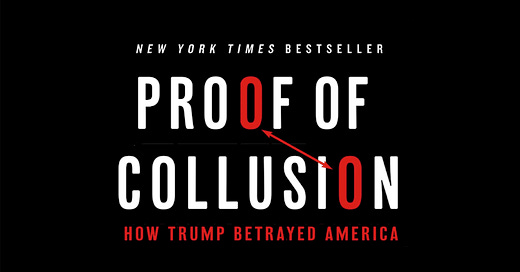



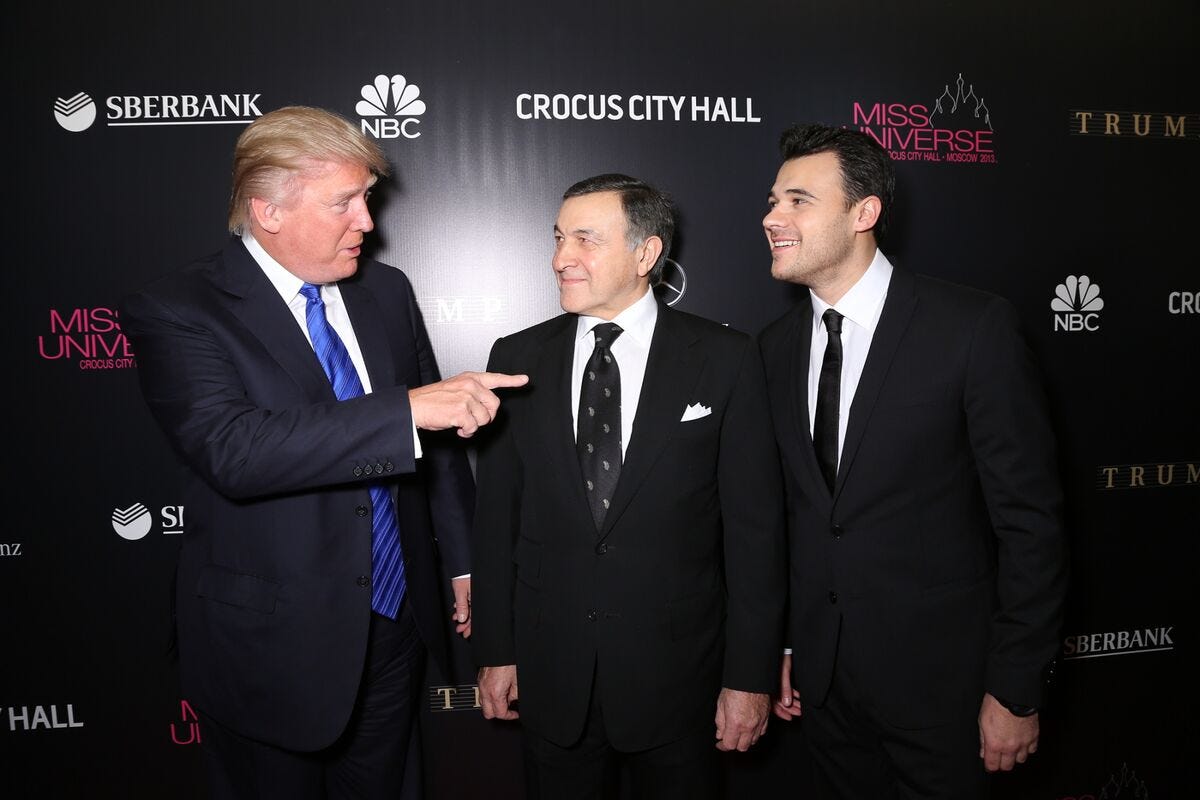
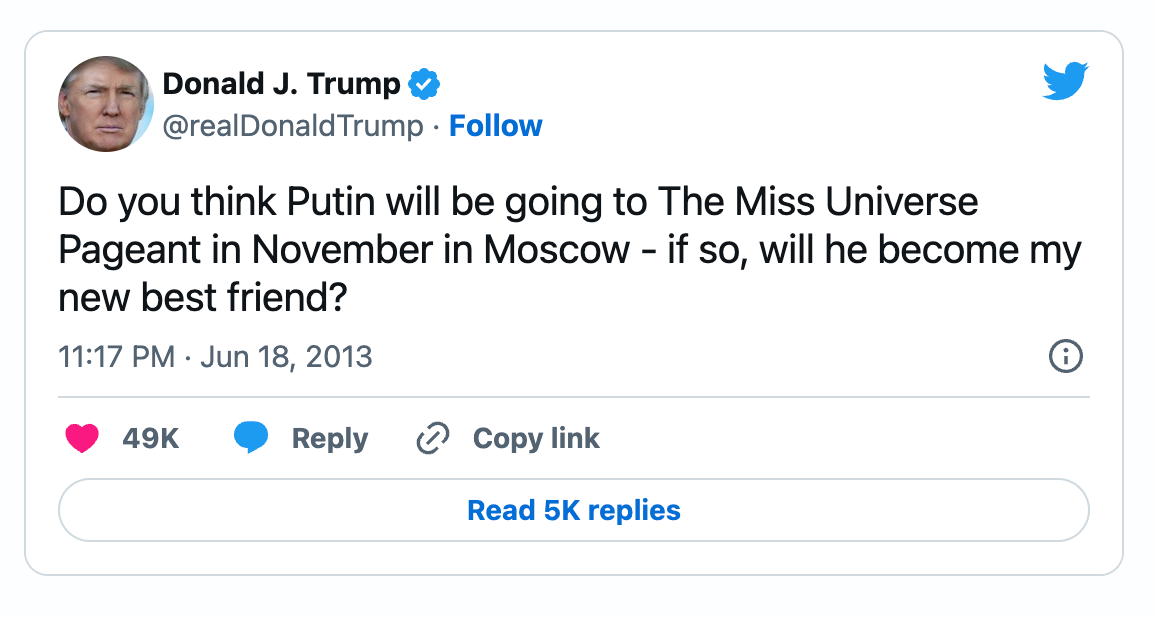
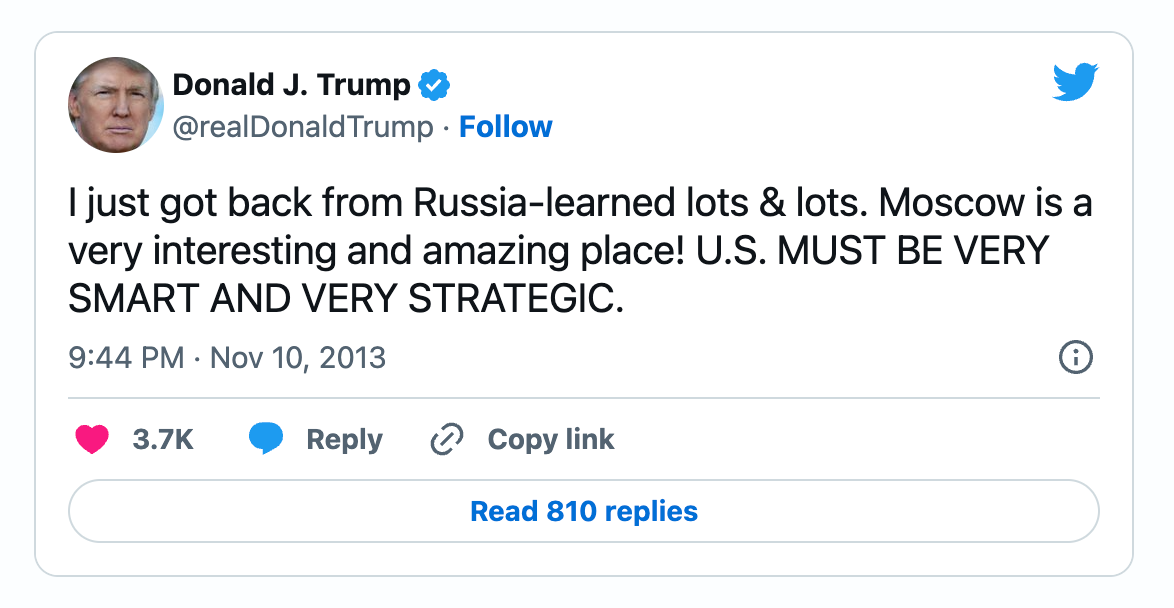
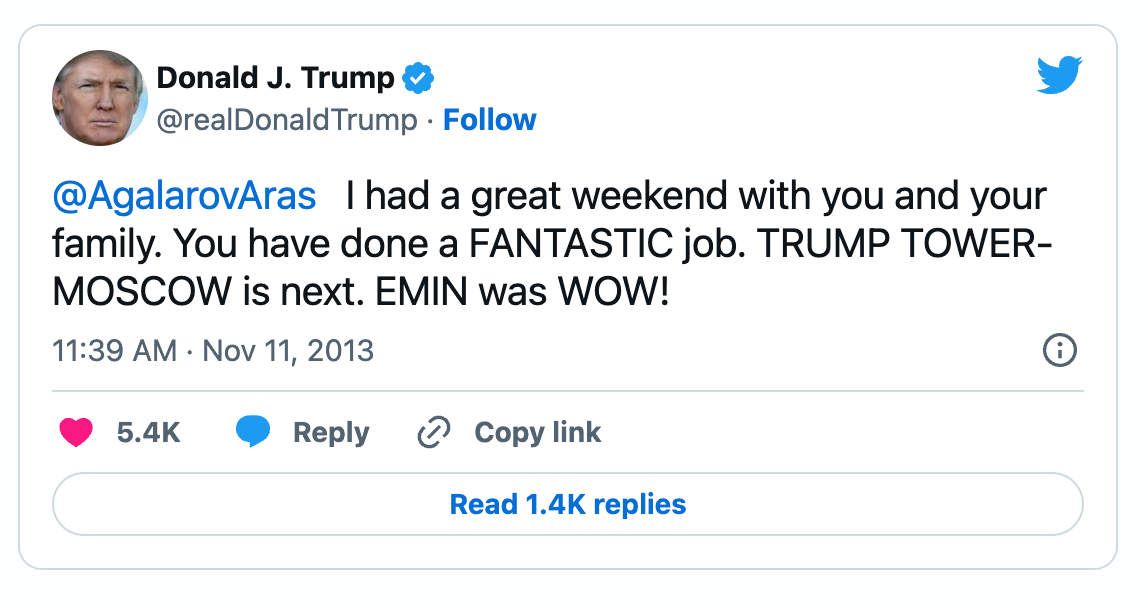
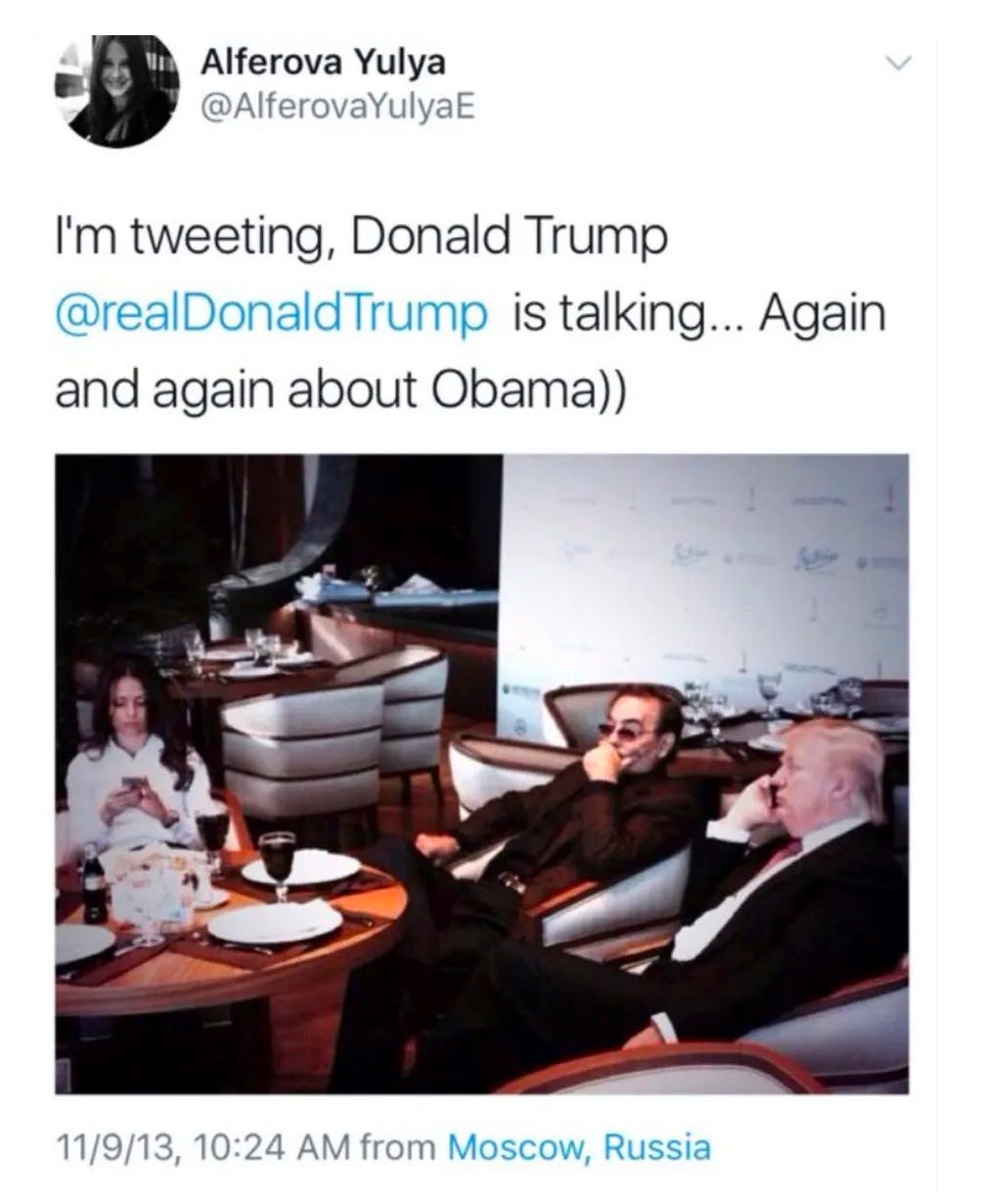
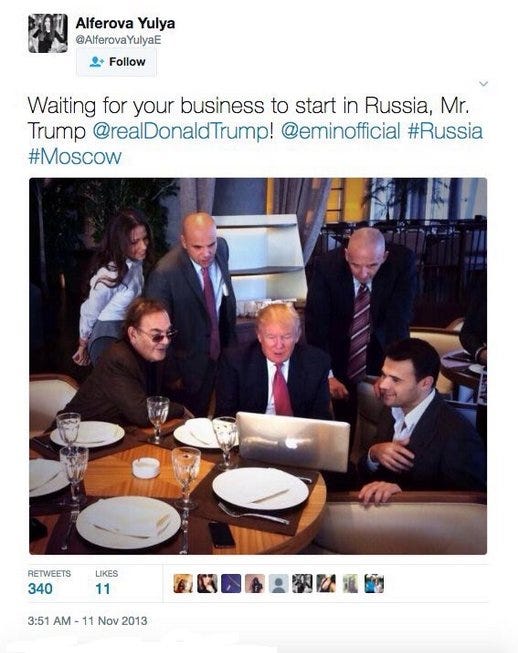
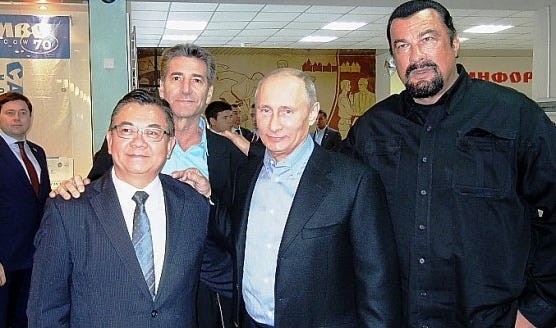
I’m so happy that you’re releasing this. The world needs to have this information.
I think we see his child like behavior best when he is making a business deal. These expressions of trust toward individual he has only known for less than 24hrs reminds me of some coked up lonely rich kid who lacks any true friends. If he hadn’t set out to destroy democracy, I could fully feel sorry for him. Would make a good tragic novel.